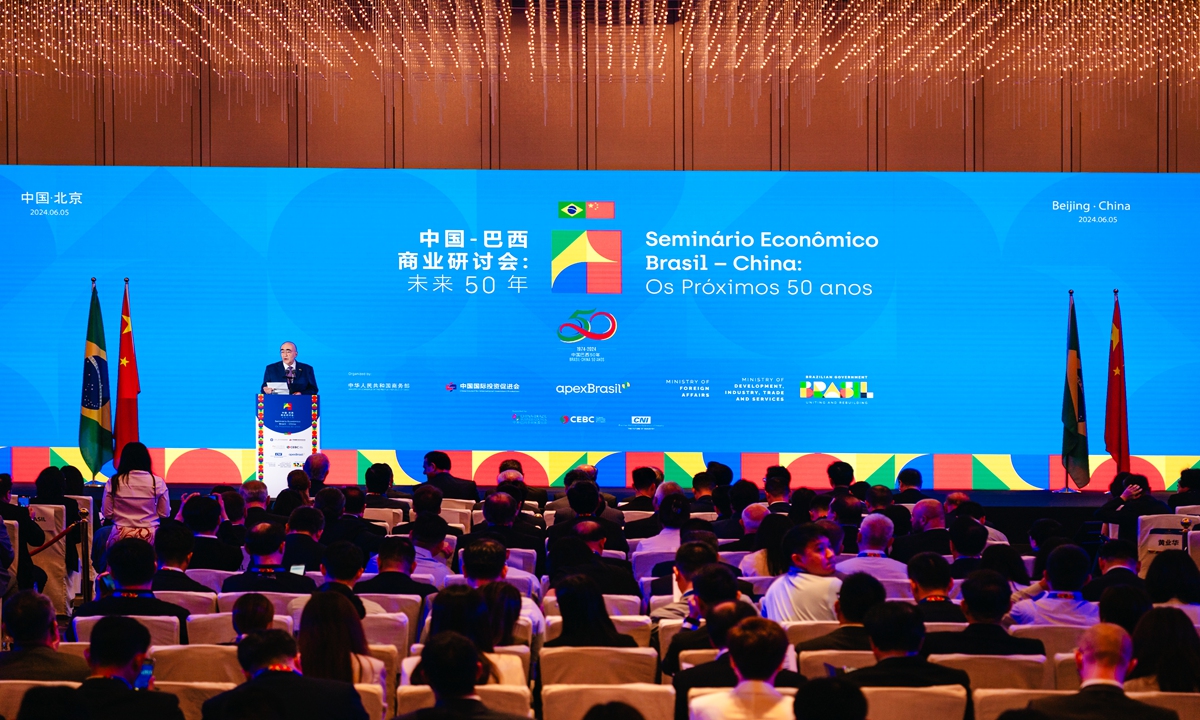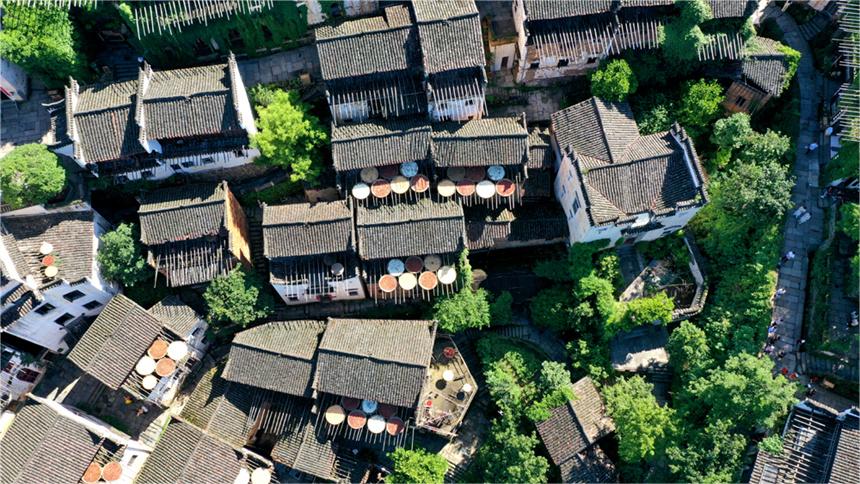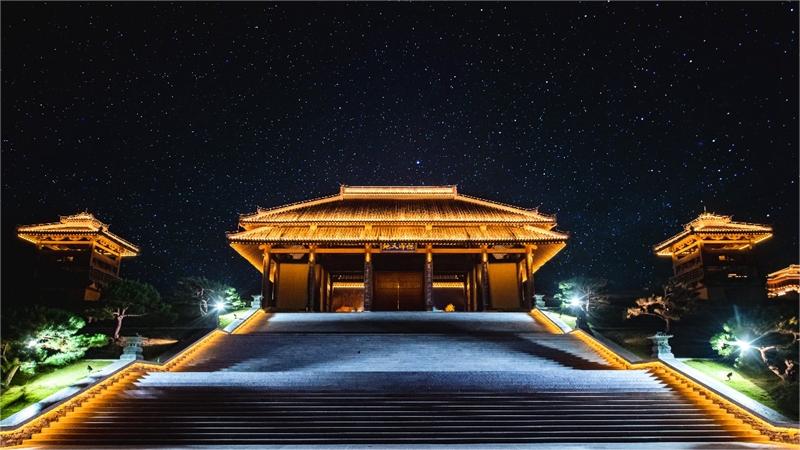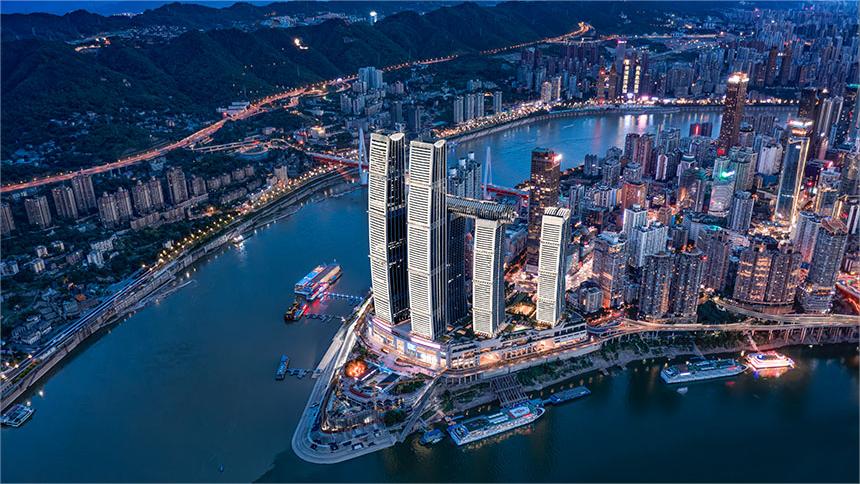Senior officials promote stronger China-Brazil industry ties to pursue high-quality development

The Brazil-China Business Seminar, a high-level event, is held in Beijing on June 5, 2024. Photo: Courtesy of the China Council for International Investment Promotion
Senior officials from China and Brazil vowed to deepen bilateral cooperation across various industries at the Brazil-China Business Seminar, a high-level forum, held in Beijing on Wednesday, amid the ongoing visit of Brazil's vice president to China and as the two countries celebrated the 50th anniversary of diplomatic relations this year.
Business cooperation is anticipated in a wide range of fields, ranging from agriculture to transportation and new energy -- key sectors that the South American country needs for industrial updating, the Global Times learned at the event.
Officials and industry representatives told the Global Times at the event that bilateral cooperation, highlighted by the strong level of complementarity, has huge potential.
Several hundred people including senior officials of both China and Brazil, diplomats and business representatives attended the event to share their insights on bilateral trade and new opportunities for cooperation.
Geraldo Alckmin, Vice President of Brazil, said that the event provides a chance to look ahead to the next 50 years of relations, which should see even greater development, and investment by both sides will have more room to grow.
"We are also pleased to see significant investment by large energy companies, including State Grid Corporation of China, operating in Brazil, as well as many Brazilian companies investing in production in China," Alckmin said, saying that he hoped to see more Chinese companies investing in Brazil, becoming partners in economic development and job creation.
In an interview with the Global Times on Wednesday, Rui Costa, Chief of Staff of the Presidency of Brazil, said that there are many booming areas where China and Brazil can align with each other in future development.
Costa gave the example of how Brazil and China can deepen cooperation in the field of new energy in facilitating Brazil's energy transition, one of the highly complementary sectors repeatedly mentioned at Wednesday's event.
The high synergy of the cooperation was also emphasized by other Brazilian officials.
Simone Tebet, Minister of Planning and Budget of Brazil, told the Global Times on Wednesday that Brazil is seeking stronger synergies between the China-proposed Belt and Road Initiative and Brazil's Reindustrialization and New Growth Acceleration Program, a kind of partnership, which is already in progress.
"It's already in our budget for 2025, 2026 and 2027 to build infrastructure projects like ports, airports, railways, highways and waterways, and we need to build a stronger partnership with Chinese private and public investors to build the infrastructure," Tebet said.
Tebet said that China has expertise in terms of industrialization, technical cooperation, communication and the energy transition, among other sectors, in which Brazil can deepen collaboration with China in pursuing its own development.
In transportation, Chinese partnerships are also welcomed.
Anderson Pomini, President of the Port of Santos, the largest in Latin America, which has connections to more than 600 ports in 125 countries and regions, said that the company expects Chinese investment and technology will help upgrade terminal operations, including introducing digitalization to boost efficiency.
Through joint efforts, including the vigorous promotion of entrepreneurs from both sides, cooperation has flourished.
According to an official report released by the Brazilian Trade and Investment Promotion Agency (ApexBrasil) at the event, since 2009, China has been Brazil's largest trading partner. Since 2012, China has become the primary source of imported goods for Brazil.
In 2023, Chinese exports to Brazil exceeded $50 billion for the first time, with a market share of 22.1 percent, the official report said.
Chinese Vice Minister of Commerce Wang Shouwen shared some very positive trade figures at the event on Wednesday, showing that bilateral trade has seen an annual growth rate of more than 20 percent in the past 50 years. Now, there are more than 300 Chinese companies operating in Brazil, spanning energy, electricity, infrastructure and mining, among others, according to Wang.
The prospects for development and cooperation in new fields are promising, Wang said, echoing similar comments by Brazilian officials. Specifically, Chinese companies' development of wind power and investment in establishing electric vehicle (EV) factories in Brazil will drive the growth of capabilities in these industries in Brazil, Wang further noted.
China is promoting the development of new quality productive forces with a high level of opening-up, while Brazil is actively promoting its reindustrialization and New Growth Acceleration Program, emphasizing the strengthening of technological innovation, Ma Xiuhong, President of the China Council for International Investment Promotion, the organizer of the event, said on Wednesday.
Given this context, Ma said that the numerous points of convergence in the economic development strategies of China and Brazil will create significant new opportunities for economic and trade cooperation.
Photos
Related Stories
- Brazilian president inaugurates 1st shipment of meat exports to China
- Brazil's vice president to visit China
- Common Understandings Between China and Brazil on Political Settlement of the Ukraine Crisis
- Top Chinese diplomat meets special advisor to Brazilian president
- Special advisor to Brazilian president to visit China
- Brazil, China see immense potential for further cooperation
Copyright © 2024 People's Daily Online. All Rights Reserved.









